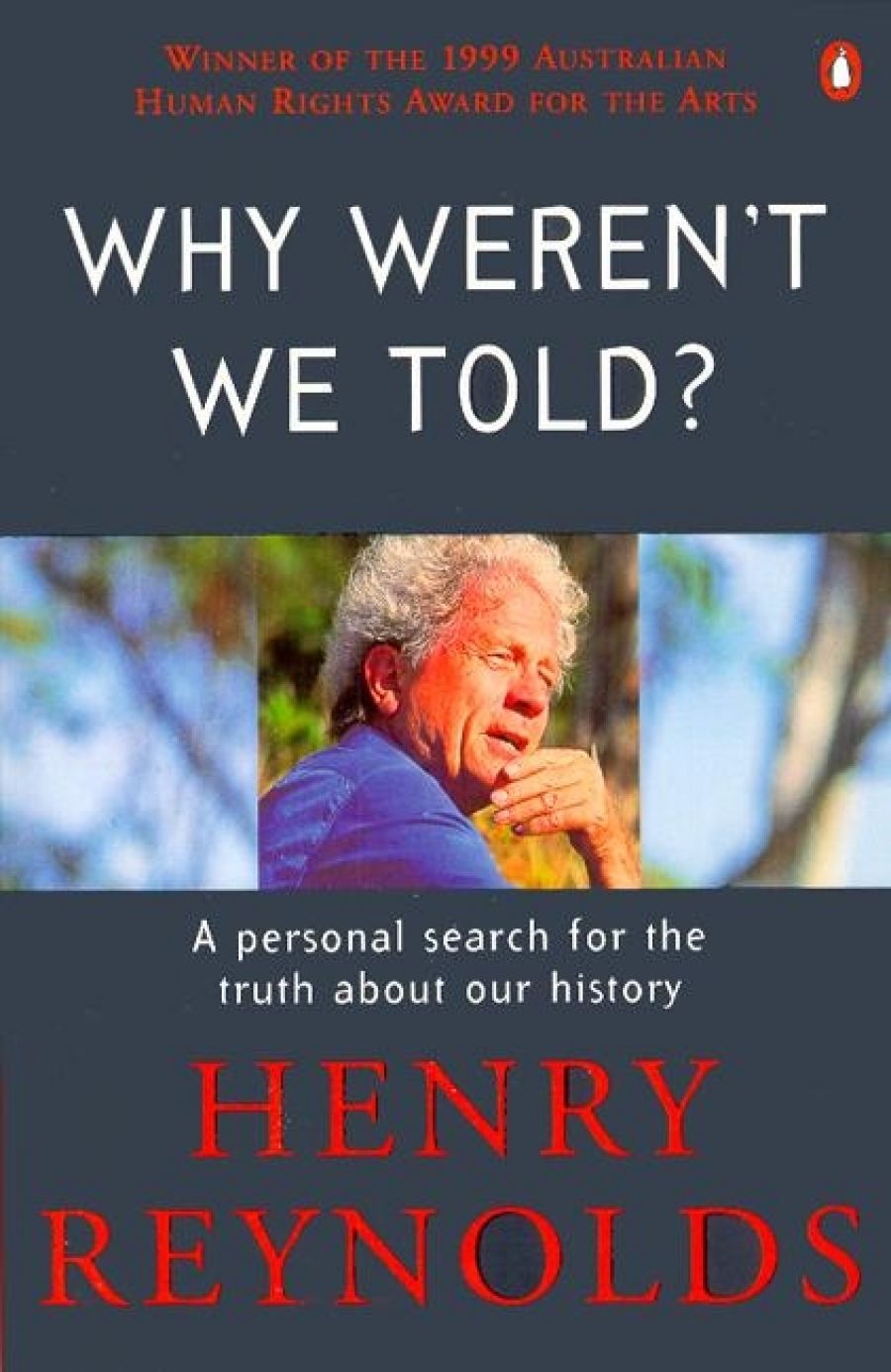
- Free Article: No
- Contents Category: History
- Review Article: Yes
- Online Only: No
- Custom Highlight Text:
In November 1998, the Governor General, Sir William Deane, found himself in the centre of a storm over the commemoration of Australia’s Aboriginal dead. Launching historian Ken Inglis’s Sacred Places: War Memorials in the Australian Landscape, Sir William remarked that in a country of more than 4,000 memorials there were none, at least of an official kind, to the Aborigines who had been slaughtered in the ‘Black Wars’ of the colonial period.
- Book 1 Title: Why Weren’t We Told?
- Book 1 Subtitle: A Personal Search For The Truth About Our History
- Book 1 Biblio: Viking $24.95pb, 264 pp
- Book 1 Readings Link: booktopia.kh4ffx.net/Koevy
His unexceptional (and incontrovertible) remarks made headlines, as did Ken Inglis’s call for tactful, imaginative recognition, in the Australian War Memorial, of the warlike encounters between black and white in this country. Immediately, the governor-general was credited with Inglis’s words as well as his own, and damned for both. Newspapers long on propriety (the governor-general should confine himself to ceremonial duties, ‘GG running off at the mouth’, etc.) were perilously short on accuracy: they ignored the corrections and clarifications issued from Government House. The story, too good to spoil with facts, ran for days. The RSL weighed in. Prime Minister John Howard opined that such commemoration would be inappropriate in the context of a war memorial. Editorials cautioned against upsetting sensitivities. One letter writer to the Canberra Times suggested Sir William Deane for president, while another proposed that Yarralumla and its grounds be turned into a park commemorating Aborigines killed in defence of their native land.
Henry Reynolds picks up the story in his new book, Why Weren’t We Told?, and follows it with an historian’s pedantry – he gets it right in other words, unlike Sydney’s Daily Telegraph, Brisbane’s Courier Mail, and Laurie Oakes on Channel 9’s Sunday program.
The story is useful as an index of current attitudes and intransigence about Australian history. It also illustrates, in miniature, the psychological complexity which still complicates white Australian understanding let alone acceptance) of the killing that was the inevitable concomitant of settlement.
It is no longer the case that the facts of Australia’s frontier warfare are inaccessible. We have been told. Reynolds’s own extensive investigative work in the documents of colonial and postcolonial history, in concert with the writing of many other Australian historians, male and female, over the past thirty or so years (Reynolds might acknowledge more often), have laid out the brute as well as the benign record. The heroic pioneer and exploration history of this country is only one layer in the thick depiction that truth requires. But the language that has characterised the public debate over the last few decades has been reductive sloganeering (‘Black-armband history’) more often than analysis. And that itself is an indication of the way in which attitudes and interpretations have become entrenched – the messenger is never welcome when his news is unsettling.
In one sense, the title of Reynolds’s most recent book pre-empts rehearsal of the arguments put by defenders of the peaceful settlement interpretation of Australian history. Why Weren’t We Told? carries the strong, if implicit, assertion that there was not just an alternative but a definitive narrative to be articulated, so much of it repressed in the twentieth century. But Reynolds’s track record gives him warrant for such a stance. Writing as he characteristically does, like a meticulous barrister preparing a case, he has presented Australia with an overwhelming weight of evidence of violent invasion, racial persecution, huge death tolls, occasional nobility or bravery on both sides, and an obfuscation of history by the victors.
Why Weren’t We Told? goes some way to explaining that obfuscation, explaining why the relative, if brutal frankness of the nineteenth-century colonisers turned into quasi-anthropological blandishments of the twentieth century. Typically, Reynolds does it with documents. Compare these two. The first is from a letter to the Hobart Town Gazette, written in 1824 by a correspondent using the non de plume Zeno:
We ought to feel that we have invaded a domain from which our invasion has expelled those who were born, bred, and providentially supplied in it; that we have driven by our usurpation, families from their birthplace, and then completed our cruelty by destroying in sport, and consuming/or profit, the principal means of their subsistence.
The second, published in 1917, is by Australia’s most famous essayist, the prolific and widely read Walter Murdoch. In a book for children titled The Making of Australia, he explains what people mean by the history of Australia:
they mean the history of white people who have lived in Australia. There is good reason why we should not stretch the term to make it include the story of the dark-skinned wandering tribes who hurled boomerangs and ate snakes for long ages before the arrival of the first intruders from Europe.
Reynolds, in Why Weren’t We Told? investigates the aetiology of that ‘good reason’ but also documents the intermittent self-awareness that led even Murdoch to use the term ‘intruders’. To do so, in this history book written for a mass audience, he uses himself as an effective case study in the national cultivation of ignorance (Reynolds, with his standard Tasmanian education, arrived in Townsville in the 1960s knowing almost nothing about racial conflict). And then he details the hard labour of working through to a detailed understanding of where we have come from and why we baulk at our collective past.
The book will be controversial. It should also prove indispensable.


Comments powered by CComment